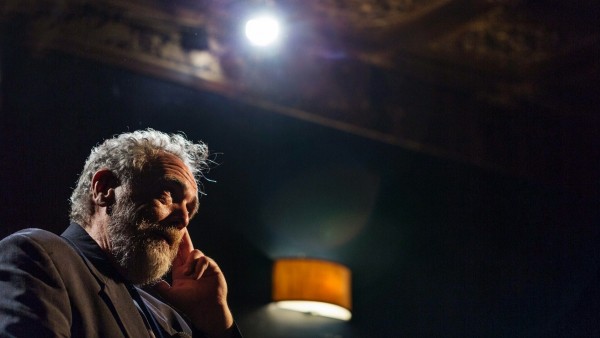Call Me Lucky
Directed by Bobcat Goldthwait
USA, 2015
Call Me Lucky introduces the film’s central figure, Barry Crimmins, to the audience as a government-hating, Catholic church despising curmudgeon. When the documentary heads to upstate New York to chronicle a scruffily bearded, firewood chopping Crimmins, now living in isolation, it makes total sense. Call Me Lucky starts off hitting all the beats of a familiar type of biopic story: Crimmins arrived on the comedy scene with a style ahead of its time, left behind a legacy that never got its due, and his greatest contribution to the business was opening doors for a younger generation of comics. Midway through the film, there is a drastic shift in the tone of Call Me Lucky that completely obliterates any notion of where the film is headed. The result is a shocking and enjoyable documentary, filled with laughs, tears, and inspiring acts of courage.
The tale of the unheralded “artist” that inspired the popular “artist” of the modern generation is well-trodden territory. Call Me Lucky’s director, Bobcat Goldthwait (a protégé of Crimmins), establishes early on that his film isn’t an obsequious passion project dedicated to his mentor. The film paints Crimmins as a difficult man to deal with, a hard drinker with an abrasive style and an unflinching liberal voice. He was a key figure in the Boston comedy scene in the early 1980’s, curating a plethora of talent that would go on to have mainstream success. While Crimmins was far from being a social outcast, those closest to him recognized his incessant volatility and shared the sense that something was “off” about him.
Crimmins possessed a rare blend of impeccable comedic timing and genius level intellect. His intellectual approach to comedy was in the vein of George Carlin and the precursor to modern day political comedy stalwarts, Bill Maher and Jon Stewart. Crimmins’ scorching style incinerated left wing and right wing views on everyone from Jimmy Carter to Ronald Reagan. Crimmins penchant for indiscriminately unleashing his caustic act on unsuspecting audiences became problematic for his career. Crimmins’ social commentaries were exactly the sort of harsh indictments that people didn’t want to hear about themselves, not from the nightly news and especially not while attending a comedy show. Crimmins’ impassioned comedic rants against consumerism, religion, and government was the equivalent of McDonald’s restaurants running video feeds from their slaughterhouses while customers ordered Big Macs. Crimmins refused to compromise his routine and as his act transformed from political humour to political tirades, he eventually alienated himself from the business.
Goldthwait deftly constructs Call Me Lucky in such a way that at around 45-minutes in, the film takes a hard turn, adding an additional layer of complexity to Crimmins and paints his comedic legacy in a different light. The film shifts to the impact of Crimmins’ 1992 revelation that he was the subject of ongoing sexual abuse during his childhood. Goldthwait isn’t afraid to take a long, steady look into the devastating events surrounding Crimmins’ abuse and it’s tough to watch. Crimmins’ account is as brutal and honest as his stand up, and his unforgiving story hits the audience like a cannonball to the gut. As he recounts the darkness that engulfed his life, it’s difficult to fathom how the incessantly indignant Crimmins grew up as well adjusted as he did.
Call Me Lucky is a fantastically crafted documentary. Goldthwait constructs Call Me Lucky in a way that almost feels like two separate films. The first half, dedicated to Crimmins’ impact on the comedy world is a hilarious and insightful tour through the 1980’s comedy scene. Goldthwait litters the first half of the film with a respectable cast of interview subjects including David Cross, Marc Maron, Margaret Cho, and Patton Oswalt. The comedians all know how to work a camera and they keep the viewers engaged with laugh out loud anecdotes. The second half of the film focuses on Crimmins as he channels his anguish into helping to protect children from sexual exploitation. Goldthwait is sly in the way that he patiently acquaints the audience with Crimmins so that his heroic journey in the second half of the film carries such an immense emotional weight. By the time that Call Me Lucky introduces its darker subject matter, Crimmins is no longer just a crotchedy old man, he’s a three-dimensional human being. The difficult subject matter takes on an extra layer of discomfort after bonding with Crimmins for 45-minutes. Call Me Lucky is an emotional roller coaster that the viewer walks away from feeling beaten and battered, but also exhilarated and optimistic.
In a piece of worn out archival footage, a younger version of Barry Crimmins states, “Everybody should just treat each other well, because there’s a lot of pain out there and comedy has nothing to do with alleviating it, it’s just a distraction man,” and by the end of the film, his statement is given proper context. Crimmins used his vocal platform as a comic to make sense of life’s pitfalls and to warn others of its potential trappings; that’s why over time, laughs became less of a priority. It makes sense that he would spend the second half of his life advocating for those that can’t defend themselves. Despite his angry disposition, Crimmins has attained an enviable level of enlightenment — in one instance, he speaks about those that have wronged him with a level of clarity and forgiveness of a holy man. The film repeatedly makes the point that his humanity isn’t restricted to those that agree with him. Barry’s ability to move past his own resentment may be his most inspiring act of all.




